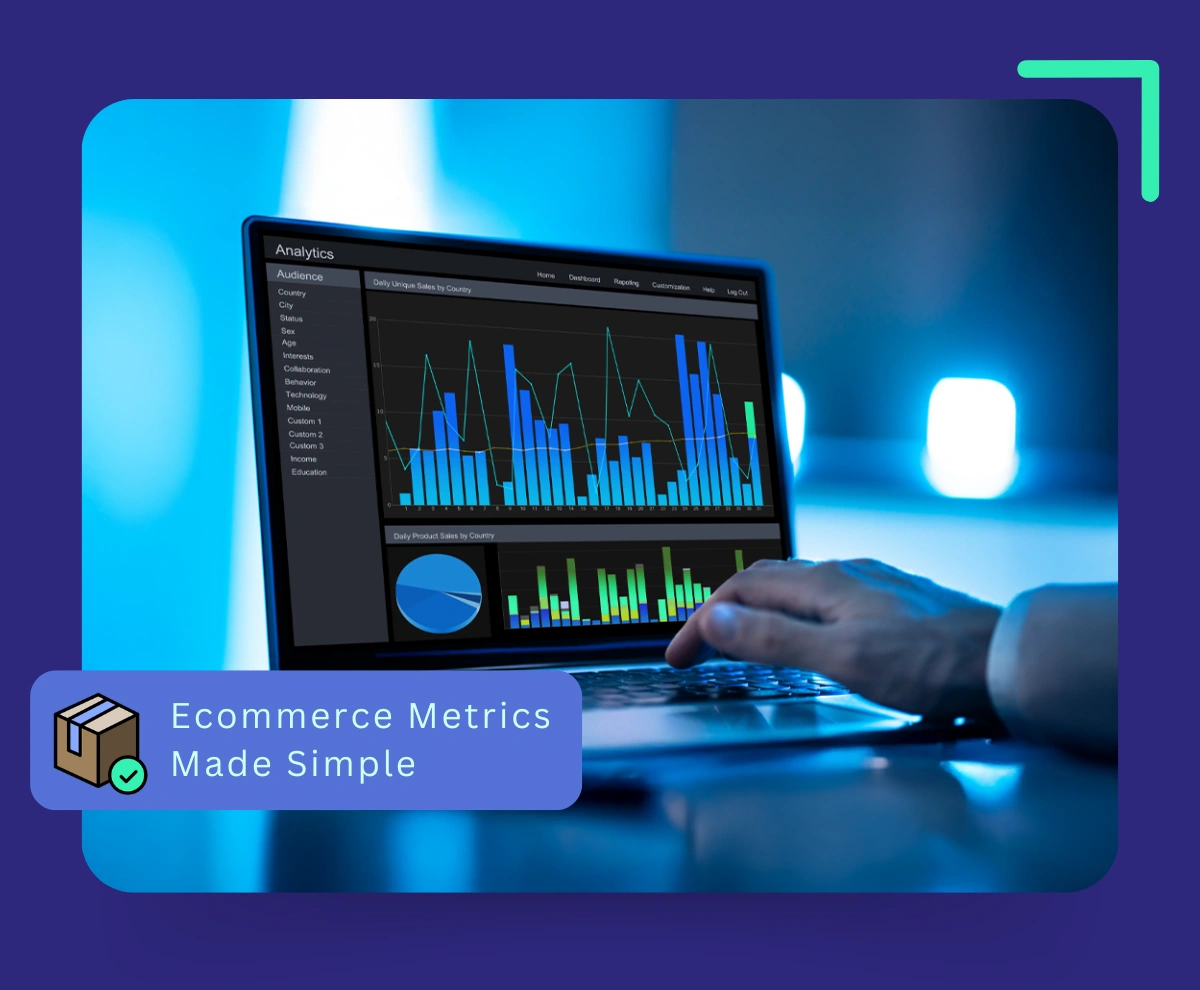In This Blog Post
Share This Article
- Published: Jul 24, 2025
- Last Updated: Jul 24, 2025
- 🔊 Listen
Quick Reads
- Specialized ecommerce accountants manage the unique financial complexities of online retail, including multi-channel sales, inventory, and sales tax.
- Outsourcing financial tasks frees up time and energy to focus on core business activities like brand expansion and product development.
- Specialized accounting services offer clear financial insights and accurate reporting, enabling data-driven decisions that drive profitability.
- Ecommerce accounting professionals use advanced software to streamline bookkeeping, inventory, and cash flow.
- Outsourced ecommerce accounting firms offer comprehensive partnerships, providing financial clarity and control essential for building a successful online store.

From Data to Dollars
Elevate Your Ecommerce with Smart Accounting & Analytics
The ecommerce market in the USA is a powerhouse, soaring past $1 trillion in 2023 and projected to top $2 trillion by 2030 (Mordor Intelligence). This growth brings incredible opportunities but also complex financial challenges that traditional accounting methods can’t handle. From multi-channel sales and complex sales tax laws to inventory management across different platforms, online businesses need a specialized approach. An ecommerce accountant offers the expertise and technological tools to manage these complexities, giving business owners the clarity they need to grow. In this blog, we will discuss how hiring an ecommerce accountant can turn out to be a sensible decision for US online businesses.
What Are the Key Responsibilities of an Ecommerce Accountant?
Ecommerce accountants offer a wide range of services, including daily bookkeeping, inventory management, and cash flow management. They can also assist with payroll, tracking essential KPIs for ecommerce businesses, and preparation of financial accounts for tax season. Below is a detailed breakdown of the primary services you can outsource to an ecommerce accountant.
Bookkeeping
The core responsibility of an ecommerce accountant is to maintain daily financial records for sales and purchases. They categorize transactions, making sure every dollar spent or earned is correctly entered into the accounting software. An ecommerce bookkeeper makes sure all entries are up-to-date to provide precise bookkeeping, which helps online businesses accurately track their financial health.
Inventory Management
Inventory management involves tracking, valuing, and optimizing stock to ensure accurate financial reporting and cost control. An accountant for ecommerce businesses helps maintain correct inventory records by reconciling purchase orders, sales, and returns with accounting software. They also ensure that inventory costs are properly classified, such as COGS versus unsold stock, and flag discrepancies that may impact margins or tax reporting.
Cash Flow Optimization
An e-commerce accountant actively manages incoming and outgoing cash to ensure the business can cover its operating costs like inventory restocking, ad spend, shipping, and platform fees. They monitor multi-channel payment inflows, reconcile payouts, and anticipate timing gaps between sales and actual fund deposits. By forecasting receivables, planning supplier payments, and reducing cash tied up in slow-moving inventory, they maintain healthy ecommerce cash flow and liquidity.
Financial Reporting and Analysis
An e-commerce accountant prepares detailed financial statements such as profit and loss reports, balance sheets, and cash flow statements that reflect real-time business performance. Along with that, they analyze the numbers to identify trends in sales, margins, inventory movement, ad spend ROI, and platform-specific revenues (like Amazon, Shopify, or eBay).
KPI Tracking
Online accountants track ecommerce key performance indicators like GMV, CAC, and AOV to monitor business health. They gather data across platforms, clean it up, and plug it into reports that actually make sense. By evaluating these KPIs, they help spot what’s working and what’s not. Solid KPI tracking through an ecommerce accountant keeps growth focused and decisions sharper.
Payroll Management
An e-commerce accountant in the U.S. oversees end-to-end payroll processing by calculating gross wages, account for deductions like federal and state taxes, Social Security, Medicare, and employee benefits, and manage direct deposits. They also prepare and file all required payroll tax forms, including Form W-4, Form W-2, Form 941 for, Form 940, and Form 1099-NEC while being compliant with US GAAP.
Invoice Processing
An ecommerce accountant manages the full invoice cycle; reviewing supplier invoices, matching them with purchase orders, verifying receipt of goods, and ensuring timely approvals for payment. For customer invoices, they ensure accuracy in tax calculations, discounts, and shipping charges before dispatch. By maintaining organized, real-time invoicing workflows, they reduce delays, avoid duplicate payments, improve vendor relationships, and support smooth reconciliation and audit readiness.
Tax Preparation
An ecommerce accountant identifies state nexus based on economic thresholds, monitors sales tax collection requirements, and ensures compliance with US GAAP. They also prepare income tax returns, maximize deductions on shipping, software, ad spend, and inventory write-offs, and file quarterly estimated taxes when needed. Their oversight helps you stay audit-ready, avoid late fees, and accurately report profits across multiple states.
How Will My Online Businesses Benefit from a Dedicated Ecommerce Accountant?
Once you hire an ecommerce accountant, it can benefit your business in multiple ways, such as reducing bookkeeping errors, improving financial clarity, and providing better control over inventory. Businesses have also reported a reduction in overhead costs, streamlined multi-channel reporting, and a renewed focus on growth. Let’s explore how your ecommerce business can benefit from an online accountant.
Reduced Errors
A skilled accountant uses powerful tools like QuickBooks, Xero, Zoho Books, or NetSuite to cut down manual errors in ecommerce bookkeeping. These platforms sync directly with your ecommerce stores and banks, which means fewer mistakes, cleaner records, and less back-and-forth with your CPA during tax season. You also get real-time updates, so you don’t have to wait till month-end to know where you stand.
Improved Financial Clarity
If you’re selling across states, you may need proper guidance in ecommerce accounting to avoid tricky tax situations. A dedicated ecommerce accountant helps you stay compliant with multi-state tax laws, tracks sales tax thresholds, and understands how marketplace facilitator rules apply to platforms like Amazon, Shopify, and Etsy.
Better Inventory Control
With multiple warehouses or dropshipping setups, inventory management for ecommerce becomes chaotic. An ecommerce accountant sets up systems to link your inventory, orders, and finances. This means fewer stockouts, no overbuying, and clearer insight into what’s really moving, helping in maintaining healthy cash flow and cutting costs.
Cost Efficiency
An eCommerce accountant improves cost-efficiency by using accounting tools to automate workflows, reduce manual errors, and simplify tax compliance. They also track key performance indicators to pinpoint unnecessary spending and optimize costs. Additionally, by managing inventory effectively, they prevent cash from getting tied up in excess stock or low-performing items.
Streamlined Sales Channel Reporting
For ecommerce businesses operating on multiple platforms, an ecommerce accountant can consolidate data from all channels into one clean report. This way, you won’t waste hours juggling exports and spreadsheets. You’ll see what’s profitable and where to adjust quickly.
More Time to Focus on Growth
When an accountant for online business handles the numbers, you can focus on launching new products or scaling your online store. You don’t need to worry about tax preparations, reconciliations, or monthly closings. The right accountant frees up your time so you can grow instead of getting stressed out because of receipts.

General Accountant vs. Ecommerce Accountant: Know the Difference
An ecommerce accountant specializes in the unique financial complexities of online businesses, whereas a general accountant handles basic tasks. Ecommerce experts possess deep knowledge of digital payment gateways, sales tax nexus laws, and platforms like Shopify and Amazon. They are purpose-built for scaling businesses, offering specialized support for inventory management, multi-channel reporting, and audit readiness according to IRS rules. The following table further differentiates between a general accountant and an e-commerce accountant.
| Points of Comparison | General Accountant | Ecommerce Accountant |
|---|---|---|
| Core Expertise | Basic accounting tasks like payroll, financial reporting, and invoice processing. | Brings all the fundamentals plus deep experience in digital commerce workflows and revenue complexities. |
| Sales Tax handling | Reliable with local and national tax obligations | Expert in handling sales tax nexus, marketplace facilitator laws, and multi-state/country compliance |
| Platform Experience | Works across general business environments | Natively understands platforms like Amazon, Shopify, Woocomerce, Etsy, eBay, and more. |
| Digital Payments Integration | Familiar with standard transaction flows | Seamlessly reconciles Stripe, PayPal, Klarna, Apple Pay, and other gateways directly with accounting systems. |
| Scalability Support | Ideal for stable businesses with predictable workflows | Purpose-built for dynamic businesses scaling across products, platforms, and geographies. |
| When to Hire | Great for traditional businesses needing structured financial control | Essential for online sellers looking to grow, optimize, or expand into new markets. |
| Audit Readiness | Supports regular audits and tax season preps | Audit-ready for platform-specific and IRS reviews—ensures clean digital trails and complete transaction logs. |
| Inventory Oversight | Can track basic inventory and cost of goods. | Uses analytics to monitor turnover, predict stock needs, and align with sales. |
Looking to Scale Your U.S. Online Store? Hire an eCommerce accounting expert!
Hiring a specialized ecommerce accountant is a strategic move for any online business aiming for sustainable growth. These professionals bring expertise in managing the unique complexities of online retail, from multi-channel sales and inventory tracking to intricate sales tax laws and payroll. By handing over these financial tasks, you gain a clearer picture of your business’s health and can reallocate your energy in expanding your brand, developing new products, and engaging with customers.
At Whiz Consulting, we provide specialized accounting services designed for e-commerce businesses. Our team has a deep understanding of platforms like Shopify, Amazon, and WooCommerce, and we use advanced software to streamline your bookkeeping, manage inventory, and optimize cash flow. Connect with us and make us a part of your business, providing the financial clarity and control you need to make informed decisions and drive profitability.

Get customized plan that supports your growth





